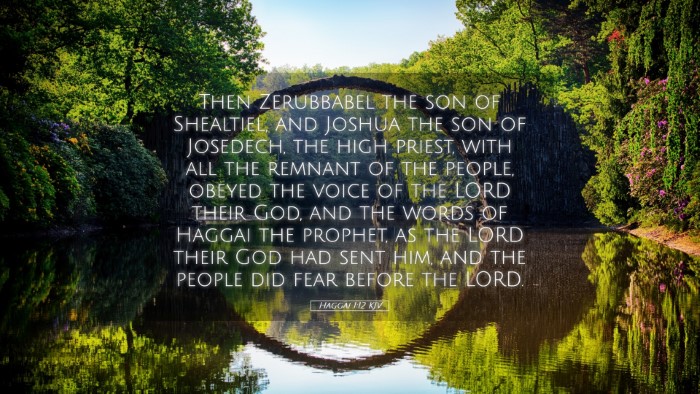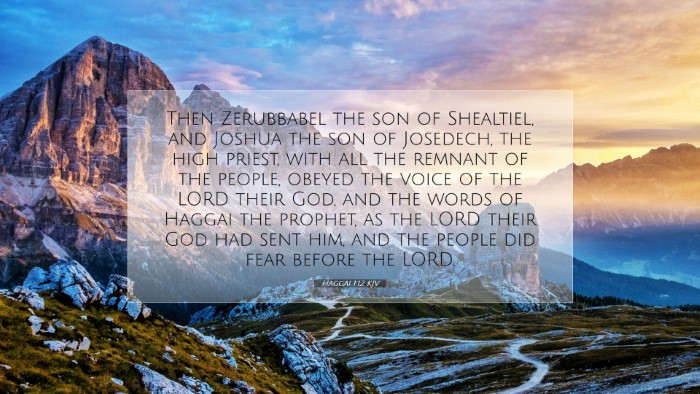Old Testament
Genesis Exodus Leviticus Numbers Deuteronomy Joshua Judges Ruth 1 Samuel 2 Samuel 1 Kings 2 Kings 1 Chronicles 2 Chronicles Ezra Nehemiah Esther Job Psalms Proverbs Ecclesiastes Song of Solomon Isaiah Jeremiah Lamentations Ezekiel Daniel Hosea Joel Amos Obadiah Jonah Micah Nahum Habakkuk Zephaniah Haggai Zechariah MalachiHaggai 1:12
Haggai 1:12 KJV
Then Zerubbabel the son of Shealtiel, and Joshua the son of Josedech, the high priest, with all the remnant of the people, obeyed the voice of the LORD their God, and the words of Haggai the prophet, as the LORD their God had sent him, and the people did fear before the LORD.
Haggai 1:12 Bible Commentary
Commentary on Haggai 1:12
In Haggai 1:12, we observe the response of the leaders of Israel and the remnant of the people to the prophetic word of Haggai. This verse encapsulates a significant moment in the context of post-exilic Israel and sheds light on the theological implications of obedience to God’s commands.
Text of Haggai 1:12
"Then Zerubbabel the son of Shealtiel, and Joshua the son of Jehozadak, the high priest, with all the remnant of the people, obeyed the voice of the LORD their God, and the words of Haggai the prophet, as the LORD their God had sent him; and the people did fear before the LORD."
Contextual Analysis
The book of Haggai is set in a historical context where the Jewish people have returned from Babylonian exile and are tasked with rebuilding the temple. The initial zeal for reconstruction has waned, and the people have prioritized their own homes over God’s house, leading to prophetic intervention.
Historical Context
- Post-Exilic Situation: The returned exiles were facing challenges as they sought to re-establish their identity and covenant relationship with God.
- Leadership Figures: Zerubbabel, the governor, and Joshua, the high priest, represent both civil and spiritual authority, crucial for unity in response to Haggai's prophecy.
Prophetic Address
Haggai's call to the people is not merely motivational; it is a divine injunction that resonates with the overarching theme of restoration. His message requires the acknowledgment of God’s authority and the necessity of prioritizing divine matters over personal interests.
Exegesis of Key Terms
- Obeyed: The Hebrew term for 'obeyed' implies a willingness to listen and act upon God's commands—an essential aspect of faithfulness.
- Fear: The 'fear of the Lord' signifies reverence and awe, which is a precursor to genuine worship and obedience.
Theological Insights
The act of obedience demonstrated by Zerubbabel, Joshua, and the remnant is significant for several reasons:
- Covenantal Faithfulness: Their obedience reflects a renewed commitment to the covenant relationship with Yahweh. This was not merely external compliance, but a heart aligned with God’s purposes.
- Collective Responsibility: The text emphasizes the involvement of ‘all the remnant of the people,’ suggesting a collective responsibility in their relationship with God and in rebuilding the temple.
- Response to Prophetic Authority: The acknowledgment of Haggai as a prophet of the Lord highlights the importance of prophetic voices in guiding God’s people.
Commentary Summaries
Matthew Henry’s Perspective
Henry emphasizes the beauty of immediate obedience to God’s voice, as shown by the leaders and the remnant. He discusses how true worship involves not only acknowledgment of God’s authority but also effective action that reflects such acknowledgment.
Albert Barnes’ Insights
Barnes notes that the response of the people shows a profound transformation and indicates their recognition of the seriousness of their neglect regarding the temple. He highlights that fear of the Lord is vital, as it leads to obedience and reformation within the community.
Adam Clarke’s Thoughts
Clarke discusses the vital role of the leaders in facilitating the obedience of the people. He points out that their fear before the Lord is foundational, ensuring that their subsequent actions align with divine expectations while fostering a communal spirit of restoration.
Application for Today’s Believers
This verse serves as a profound reminder for contemporary believers about the necessity of obedience to God’s voice, especially in the context of rebuilding faith and community.
- Prioritizing God’s Work: Believers today are challenged to prioritize God’s mission over personal desires, reflecting genuine faith through action.
- Gathering as a Community: The collective obedience of the remnant illustrates the significance of unity in worship and service among God’s people.
- Listening to Prophetic Voices: The need for discernment in heeding spiritual leaders and their guidance remains crucial in modern contexts.
Conclusion
Haggai 1:12 encapsulates a pivotal moment that reveals the heart of obedience and fear before God. As we reflect on this passage, may we aspire to emulate the faithfulness displayed by Zerubbabel, Joshua, and the remnant. Their example calls every believer to active engagement in God’s work, anchored in a reverent fear of the Lord and a resolute commitment to His purposes.


